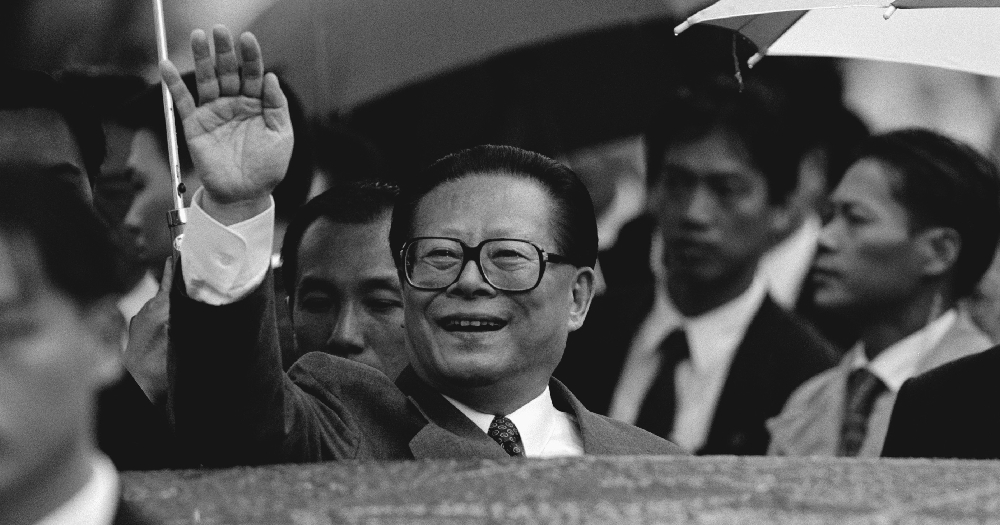Follow us on Telegram for the latest updates: https://t.me/mothershipsg
Former Chinese President Jiang Zemin has died at the age of 96 in Shanghai due to leukemia and organ failure, Chinese state media Xinhua announced on Wednesday, Nov. 30.
Who was Jiang?
Jiang, who was also former General Secretary of the Chinese Communist Party, was an electrical engineer by training, and joined the CCP while in university. From there he started his career in an automotive factory before joining local government and rising through the ranks.
By the mid-80s, Jiang had become the head of the CCP in Shanghai, as well as its mayor. By all accounts, he enthusiastically carried out the economic reforms decreed by Deng Xiaoping.
Deng had, in the aftermath of the chaotic final years of Mao Zedong's rule, taken markedly different approach to the economy, welcoming a more market based approach. Deng had also worked to reform the CCP, to prevent a Mao-esque cult of personality from ever forming again.
Deng tried to implement a more institutionalised version of the CCP. While he himself was in power, he wielded considerable personal power, but what he left to his successors was more diffuse, and meant to encourage renewal. It is from Deng the norm of two five year terms for China's leader came from.
But it was Jiang who cemented that reform. Rising to power in the aftermath of the Tiananmen Square Massacre, Deng needed to find a leader who could take over after him. Jiang ultimately proved to be that leader.
The BBC says that he had gained the reputation of being a "flowerpot", looking good but doing nothing. But former U.S. Ambassador to China James Lilley said that he was instead a "good consensus builder" and "a good manipulator".
China in 1989, the year Jiang took over as president, was essentially a pariah state. The brutal crackdown on student protestors had poured cold water on the economic and international reopening engineered by Deng, as foreign investors were unsure if they should continue on.
By the time Jiang left power, China was the fastest growing economy in the world, and Jiang had successfully negotiated its entry in the World Trade Organisation, something considered unthinkable in the days after Tiananmen.
He manoeuvred China through several international incidents, including the bombing of China's embassy in Serbia by United States aircraft, and the mid-air collision of Chinese and U.S. military aircraft off the coast of Hainan in 2001. That incident seemed to set the stage for a looming conflict between China and the U.S., before it was swept away in the maelstrom of September the 11th.
Jiang would be also known for his contribution to CCP thinking, the "Three Represents", which according to Nikkei, was developed by Wang Huning, the political theorist now in the Standing Committee of the Politburo, China's most prominent leadership group.
Jiang would hand over power to his successor Hu Jintao in 2003, setting the stage for what many observers thought would be a thoroughly institutionalised China. Leaders with ten year terms, successors clearly designated. Not democratic, but focused on the interests of the party, and not one man.
Jiang wielded much power behind the scenes as well, being said to have masterminded the ascent of current leader Xi Jinping.
Rare footage
Jiang was known for his candidness as well, with a rare video capturing him scolding a batch of young Chinese journalists.
He was sitting with the first Chief Executive of Hong Kong, Tung Chee-hwa, and the journalists were asking if Jiang would back Tung for another term in office. Jiang quickly grew exasperated, saying that he had already said the central government backed Tung, but also that there was no way for them to say otherwise without undermining the man.
His complaint was that the journalists were naive, and basically incompetent, as compared to their western counterpart Mike Wallace. Referring to an hour long interview Wallace had done with Jiang, Jiang noted the ease at which he and the American journalist were able to converse, the implication being despite their massive difference in values and world views.
In the video, Jiang called himself "shen jing bai zhan" (身经百战), which essentially means a veteran of a hundred battles. Perhaps appearing like a grizzled old warrior who had learned the ways of the world, he fretted, as Chinese leaders are wont to do, about the capability of the younger generation -- lauding them for their work rate but belittling their other attributes.
Regardless, it is remarkable to see a Chinese leader display his emotions so openly -- something that has become quite a rare sight among his successors.
Top image via Getty Images
If you like what you read, follow us on Facebook, Instagram, Twitter and Telegram to get the latest updates.
